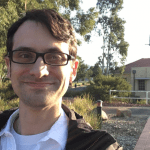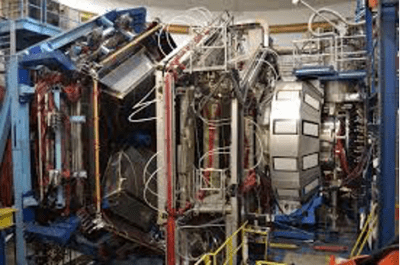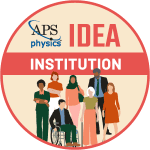UConn Physic alum, Dr. Hyewon Pechkis, an Assistant Professor of Physics at the California State University Chico recently received the prestigious CAREER award from the National Science Foundation. This five-year grant titled “Making a Difference in First Year Underrepresented Students’ Education through Research: Quantum Coherence in a Bose Thermal Gas” will facilitate the involvement of CSU Chico undergraduates in experiments on ultracold atoms and quantum science. Hyewon was a graduate student with Prof. Ed Eyler, receiving her PhD from UConn in 2010 for her work on ultracold molecules. Congratulations Hyewon!
Day: September 16, 2020
New Physics Faculty: Chris Faesi
We are very excited to extend a warm welcome to a new UConn Physics Faculty member, Dr. Christopher Faesi. Chris is an astrophysicist, specializing in both observational work and modelling, primarily in the study of star formation. He got his PhD at Harvard University, followed by a postdoc at the Max Planck Institute for Astronomy in Heidelberg. Most recently Chris was awarded a prestigious NSF Postdoctoral Fellowship at UMass Amherst, and will be on research leave this academic year, completing this Fellowship. Chris is heavily involved in several large-scale international collaborations that will probe the physics of the interstellar medium in nearby galaxies with unprecedented resolution and spectral coverage. He also has extensive experience leading mentorship and outreach activities devoted to students at all levels, as well as the general public. We are looking forward to welcoming Chris to UConn!

Prof. Kyungseon Joo named Chair of CLAS Collaboration at Jefferson Lab
Kyungseon Joo, a professor of physics, has been named Chair of the CLAS Collaboration, one of the largest international collaborations in nuclear physics. CLAS involves 50 institutions from 9 countries and has about 250 collaborators. The collaboration recently completed the upgrade of the CEBAF Large Acceptance Spectrometer (CLAS12) for operation at 11 GeV beam energy in Hall B at Jefferson National Laboratory in Newport News, VA, funded by the United States Department of Energy.
CLAS12 is based on a dual-magnet system with a superconducting torus magnet that provides a largely azimuthal field distribution that covers the forward polar angle range up to 35°, and a solenoid magnet and detector covering the polar angles from 35° to 125° with full azimuthal coverage. Trajectory reconstruction in the forward direction using drift chambers and in the central direction using a vertex tracker results in momentum resolutions of 1% and 3%, respectively. Cherenkov counters, time-of-flight scintillators, and electromagnetic calorimeters provide good particle identification. Fast triggering and high data-acquisition rates allow operation at a luminosity of 1035 cm−2s−1. These capabilities are being used in a broad scientific program to study the structure and interactions of nucleons, nuclei, and mesons, using polarized and unpolarized electron beams and targets for beam energies up to 11 GeV.
As Chair, Joo represents the collaboration in scientific, technical, and managerial concerns, while he closely works with the Lab management on scheduling experiments, organizing collaboration activities and expanding the reach of the collaboration. He currently focuses on collaboration-wide efforts to timely make first publications from CLAS12 with high impact science.

Physics Department Joins APS-IDEA Network
The Physics Department’s Diversity & Multiculturalism Committee (DMC) was accepted into the APS Inclusion, Diversity and Equity Alliance (APS-IDEA).
Despite years of efforts on local and national levels, the diversity in many physics departments is not reflective of the diversity nationwide. Our department is no exception in this regard. The new APS initiative was created to advance equity, diversity, and inclusion (EDI) in physics by establishing a community of transformation. The international network is formed of teams from over 90 physics departments, laboratories, and other organizations from USA, Canada, Brazil, Germany, and Finland that share the same EDI goals.
The inaugural virtual workshop took place this Summer with over 180 attendees, including APS, AIP, advisory board, and the APS-IDEA steering committee. The next workshop is scheduled for September and more workshops will be organized throughout the year. Acceptance of the departmental DMC positions the UConn Physics Department on the map of global institutions to collectively exchange ideas, learn, and enact strategies for improving EDI in physics. What can we expect? The vision of this initiative is to make physics community more inclusive. The participating teams will exchange ideas/experiences, deepen their knowledge of EDI research and effective practices, and receive guidance to prepare realistic sustainable plans for improving EDI.
Our APS-IDEA team consist of members at the Physics Department from all departmental levels (faculty, staff, graduate and undergraduate students). Current team members are: Elena Dormidontova (Chair of Diversity & Multiculturalism Committee), Gayanath Fernando, Gloria Fonseca Alvarez, Menka Jain, Aditi Mahabir, Belter Ordaz Mendoza (team contact), Dave Perry, Peter Schweitzer, Megan Sturm, Jonathan Trump, Diego Valente, and Susanne Yelin. The application was supported by the Department Head Barry Wells. All members of the Physics Department are invited and encouraged to join our APS-IDEA team. Together we can enhance inclusion and belonging in physics.
https://www.aps.org/publications/apsnews/202008/aps-idea.cfm
